Electoral commission had the power to postponepublished at 10:50 BST 5 September 2022
The Supreme Court says it was satisfied that the electoral commission had the power to postpone some of the the elections in parts of the country.
The Supreme Court dismisses Raila Odinga's challenge to the presidential election results
The chief justice rejected all of the arguments of the petitioners
William Ruto is the president-elect of Kenya
He pledges to work for all Kenyans
Swearing-in is now set for next Tuesday
Ruto's main challenger Odinga had said the result was fraudulent
Odinga says he respects the court but disagrees with the ruling
Basillioh Rukanga, Emmanuel Onyango, Damian Zane and Cecilia Macaulay
The Supreme Court says it was satisfied that the electoral commission had the power to postpone some of the the elections in parts of the country.
The chief justice is reflecting on whether the postponement of some of the elections on 9 August had an impact of Raila Odinga's support.
The chief justice says there was no evidence that election forms in the online results portal were changed from the original printed forms.
Justice Koome, in a stinging criticism of some of those who presented affidavits, warns lawyers against presenting misleading or fabricated evidence.
In one case she says that the evidence proved to be "hot air" and sent the court on "a wild goose chase".
The chief justice says there was no evidence that anyone accessed the results transmission system to tamper with the results. She says the commission sufficiently explained how the system captured the results forms.
She adds that the argument that the integrity of the public portal was compromised was disproved.
The second issue that was raised by the petitioners was whether there was interference with the results as uploaded to the electoral commission’s portal.
The judges were not persuaded by the allegation that the technology failed the test of integrity, verifiability, security and transparency, the chief justice says.
Chief Justice Martha Koome is talking about the technology used.
She says the judges have looked at whether the technology deployed by the electoral commission met the standards of integrity, verifiability, security and transparency to guaranty accurate and verifiable results?
A lack of trust in the electoral system has endured for a long time, she adds, this led to the introduction of technology follow the 2007 election review.
Crowds have gathered in Eldoret town in the Rift Valley town of Eldoret, in Kenya's stronghold of William Ruto, who was announced the winner of the 9 August general election.
They are following proceedings from a big screen on one of the streets.
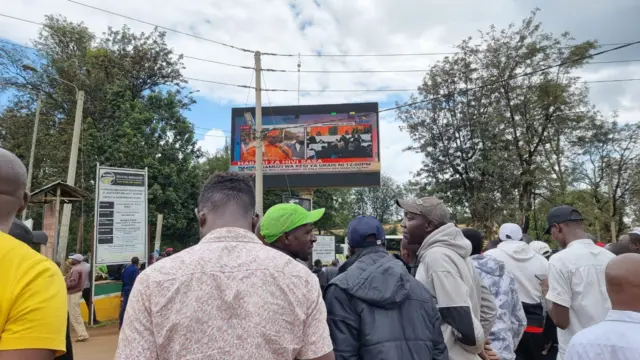
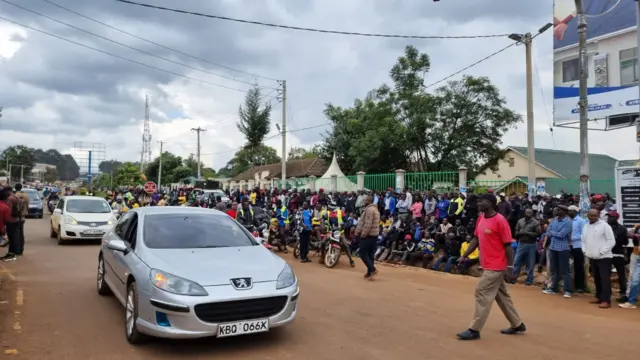
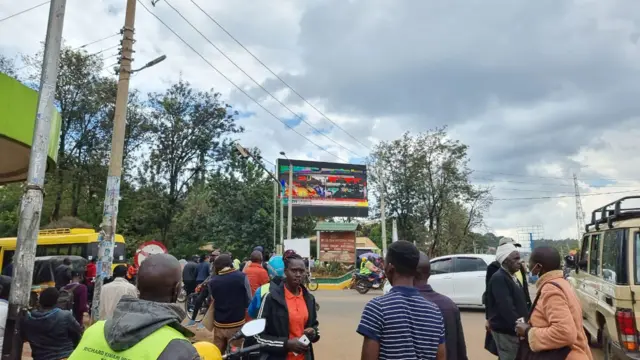
The seven judges of the Supreme Court have started proceedings for delivery of judgement in the presidential election case.
Chief Justice Martha Koome has started reading an abridged version of the judgement.
The ruling is about to begin.
Raila Odinga is hoping to repeat his court success of 2017 when he managed to get the result of that year’s presidential election - which he lost to Uhuru Kenyatta - overturned.
The Supreme Court said it was not "conducted in accordance with the constitution" citing problems with the way the vote was carried out.
A re-run was ordered, but Mr Odinga boycotted that vote saying the electoral commission had not made the necessary changes.
Mr Odinga also went to court in 2013 to challenge that year’s outcome - but he failed to get the result nullified.
We're about 10 minutes away from the scheduled start of the reading out of the ruling, and there are several possible outcomes:
Kenya Supreme Court judges are in the court precincts ahead of the ruling on the petition challenging the presidential election outcome.
Lawyers and both parties' representatives, as well as some of those representing the electoral commission, are also arriving into the main hall.
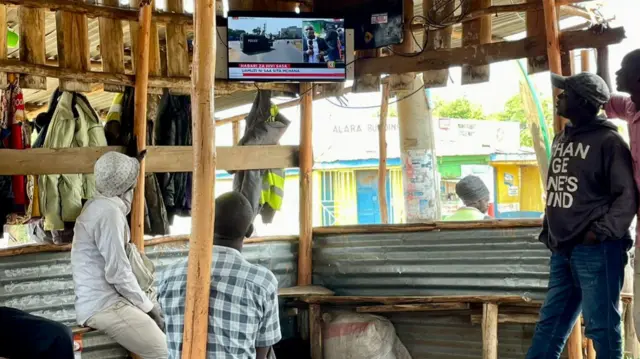
Crowds have started gathering around TV sets in the western town of Kisumu - a traditional stronghold of Raila Odinga.
The BBC's Roncliff Odit has snapped a group of apprehensive residents seated in a small shed where a TV is airing coverage of events outside the Supreme Court in the capital, Nairobi.
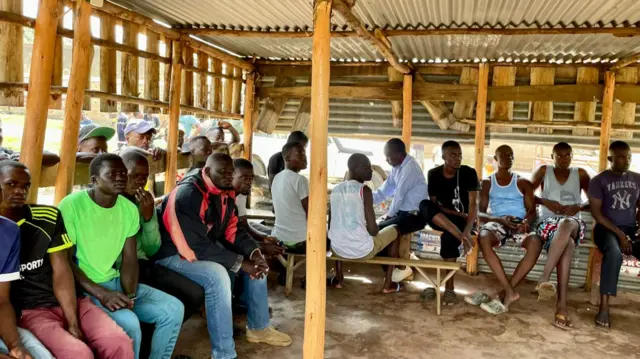
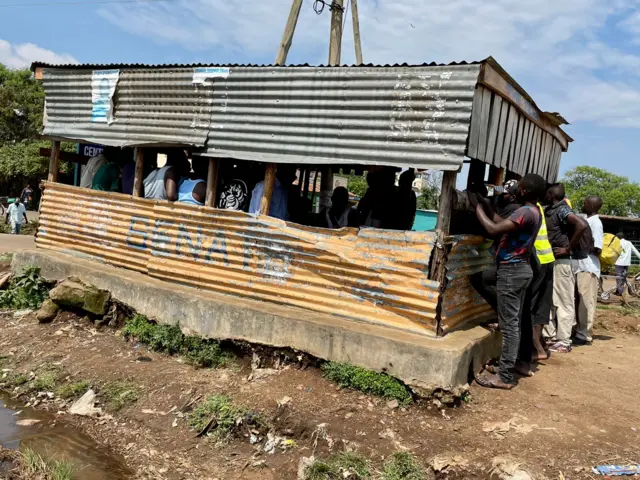
Security has been enhanced at Kenya's Supreme Court vicinity ahead of the ruling on the case challenging the presidential election results
Roads leading to the court have been closed.
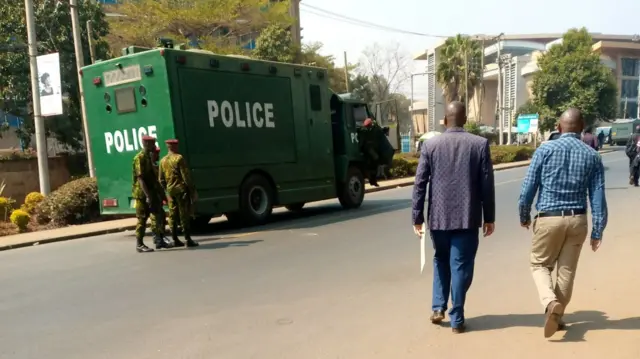 Image source, BBC/Michael Kaloki
Image source, BBC/Michael Kaloki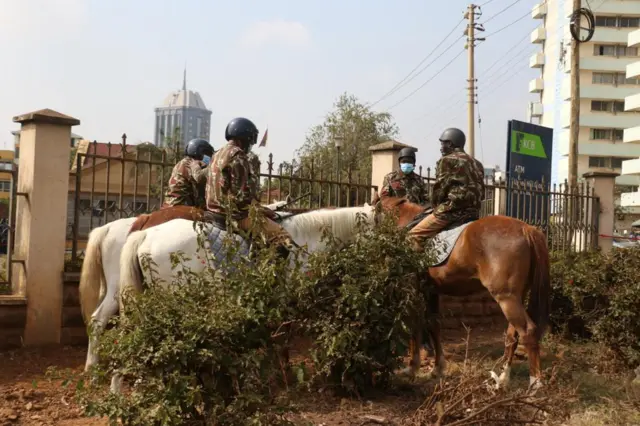 Image source, BBC/Mildred Wanyonyi
Image source, BBC/Mildred WanyonyiThe roads around the court have been cleared of traffic and people and vehicles are being diverted as per an earlier police directive.
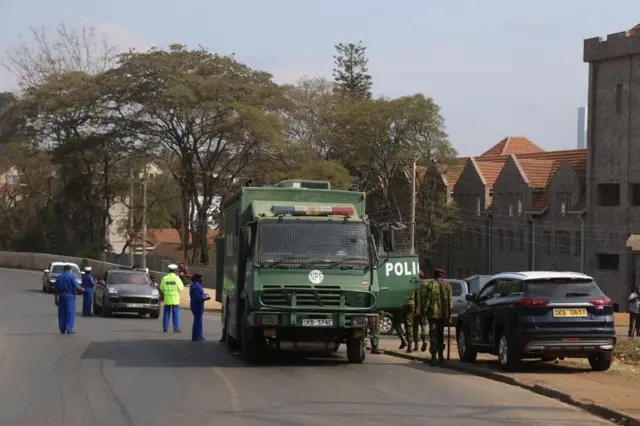 Image source, BBC/Mildred Wanyonyi
Image source, BBC/Mildred WanyonyiJudges and the legal teams for various parties are yet to arrive.
The judgment is expected to be delivered at 12:00 local time (09:00 GMT)
Analysis
 Dickens Olewe
Dickens Olewe
BBC News
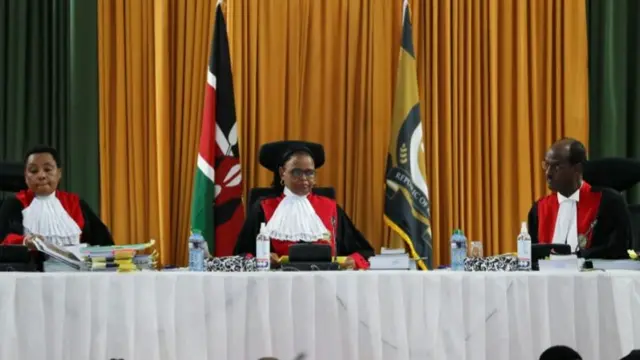 Image source, Reuters
Image source, ReutersThe court will be resolving a third presidential election dispute since it was established
After an intense week dominated by televised legal hearings the Supreme Court is set to deliver a consequential ruling about the presidential election.
Eight petitions challenged the conduct of the poll, all calling for its nullification including one arguing that none of the presidential candidates garnered the requisite 50% +1 of votes cast.
Some also alleged interference during the results transmission process including vote tampering, but the electoral commission’s lawyers put up a strong defence against the claims.
The judges will either confirm William Ruto as president-elect, order a repeat election or a runoff between the main candidates.
A re-run will give former Prime Minister Raila Odinga another shot at the presidency, but it will undoubtedly create a crisis because the electoral body team is divided - after four of its seven commissioners argued in court that the procedures leading to the result of the 9 August poll were “opaque”.
They accused the chairman Wafula Chebukati of running a one-man show.
Mr Odinga has also said he would not participate in an election run by Mr Chebukati.
A fresh election will also be a setback to Mr Ruto - who has in the last two weeks transformed from a candidate to focusing on forming a government.
Several commentaries leading to Monday’s much-awaited ruling have been critical of the now, almost inevitable, some say meddling, role of the Supreme Court in Kenya’s election process.
But that's exactly how it should be, born out of the crisis of the 2007 post-election violence, a new constitution gives election losers the right to take their case to court, even if some perceive their claims as frivolous.
It may be frustrating, but it should be the only way of resolving election disputes.
In 2017, before delivering the majority ruling that annulled that year’s election, then chief justice David Maraga famously said: "The greatness of any nation lies in its fidelity to the constitution and adherence to the rule of law and above all respect to God."
The decision was celebrated and criticised in equal measure, but it set the standard for election conduct; that illegalities and irregularities would not be tolerated.
As the court retired to write the ruling last week on Friday, Mr Maraga's successor Martha Koome asked Kenyans to pray for the judges as they consider to "render a judgement that promotes our constitution, that is anchored in the law, that nurtures our democracy and that brings harmony to our country".
Whatever the seven judges decide; unanimously or not, Kenyans should be proud that they have created a respected institution that arbitrates high stakes political contests.
Many countries around the world wish they had similar institutions. The challenge for Kenya, as for any democracy, is to ensure that everyone respects and adheres to the court’s decision.
Mr Odinga and Mr Ruto have both said they would accept the final ruling, whichever ways it goes. I think that's worth applauding.
Kenya’s Supreme Court is due to deliver its ruling on the challenge by Raila Odinga to the result of the 9 August presidential election at 12:00 local time (09:00 GMT).